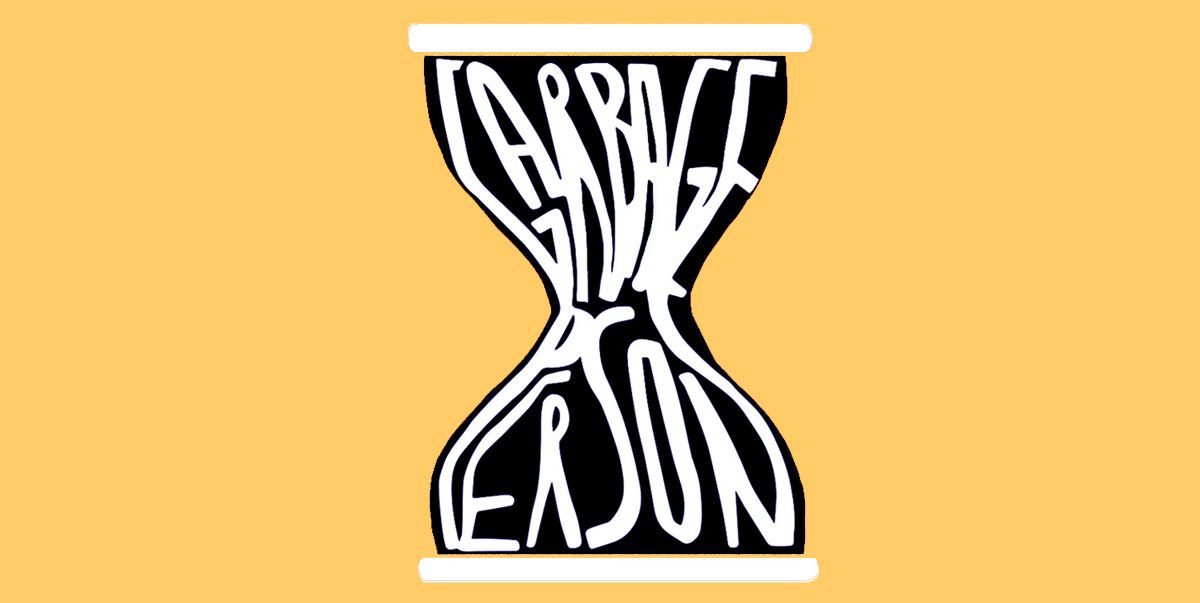The Linguistic Appeal Of ‘Garbage Person,’ The Internet’s Favorite Insult
We trace the phrase’s provenance from Charles Manson to Clickhole.

In the second-ever episode of Broad City, the Comedy Central sitcom that chronicles a certain strain of NYC millennial life, viewers were treated to a particularly relatable scene. Character Abbi Abrams, extremely high inside a generic office supply store, watches a series of strangers do obnoxiously wasteful things–throw a ream of paper into the trash, hog the copy machine, fill a box with packing peanuts in order to ship a pillow. Overcome with disgust, she mumbles to herself. She paces the floor. Finally, she snaps, screaming at her oblivious tormentors the worst thing she can think of: “You are garbage people living on garbage island!”
Pay even brief attention to television or the Internet, and she’s quickly proven right: these days, garbage people are everywhere.
“Garbage person,” like “bloodsucker” or “Neanderthal,” is the type of descriptor that pretty much defines itself. In the interest of clarity, though, the term as used here does not refer to a sanitation worker, or a person made from actual detritus. It is, instead, someone terrible beyond belief, but in an everyday sort of way.
According to recent headlines, someone who ends their texts with a period may be a garbage person. Same with someone who refuses to chase down runaway napkins when they blow off their table, or chooses to listen to songs from the Entourage movie trailer.

The possibilities are as broad and as specific as the accuser’s particular spectrum of annoyance. “I mostly use it to refer to people with whom I am very frustrated, or whose inattention to something has cost me time and energy,” writes Stanford Ph.D. student and prolific insult-slinger Maxwell Suechting in an email.
According to the Oxford English Dictionary, “garbage” has been used figuratively to refer to worthless or offensive things since the late 16th century–almost as long as the word has existed at all. In 1592, satirist Thomas Nashe begged bookstore-keepers not to stock newspapers, so as to keep their shops from becoming “infected with… stinking garbadge,” and usage has continued apace.
“Saying ‘that person is garbage’–that’s old,” says internet linguist Gretchen McCulloch. “But saying ‘that’s a garbage person’ is, I think, a newer construction.”
Indeed, the legacy of the garbage person, though storied, seems to stretch back slightly less far. One of the earliest mentions on record is from the testimony of Charles Manson, who used the term to describe himself: “As we have tin cans and garbage alongside the road, and oil slicks in your water, so you have people, and I am one of your garbage people,” he said during the 1970 trial that landed him in prison for life. In the 1996 Reese Witherspoon vehicle Freeway, serial killer Bob Wolverton reverses the referent, telling Witherspoon’s character that he murders only “garbage people.”

These days, the term skews less sinister and more silly. It’s also way more common. Joking about the caliber of celebrity present at the 2014 Golden Globes, host Amy Poehler told Matt Damon that, in comparison to luminaries like Meryl Streep and Kevin Bacon, he was “basically a garbage person.” Damon just laughed.
Garbage people are also making increasingly frequent cameos on television these days; in addition to Broad City, they’ve popped up in Girls, New Girl (“you’re a garbage person and you should live in a dumpster with snails!”), and Bojack Horseman. And a brief Twitter search unearths no end of accused garbage people, along with at least one proposed moratorium on the phrase.
McCulloch doesn’t remember the first time she came across the idiom, but she does have a theory about its proliferation. “I think what’s different about this one is that it’s garbage being used as a prenominal modifier,” she says. When used in the traditionally insulting way, she points out, “garbage” is a plain old noun. Utter “this person is garbage,” and you’re setting up a direct comparison between those two things, in order to illustrate said person’s badness.
When used in this new way, though, garbage comes before the noun, a place usually reserved for descriptors or adjectives. There are only a few cases where nouns double as prenominal modifiers–“shit” is an example of this, says McCulloch. “Swear words are very versatile,” she says. “You can do all sorts of things with them.” Putting “garbage” or other nouns in this privileged syntactic position gives them some of the oomph of a swear.

This is perhaps best illustrated by the War and Peace of garbage content creation, Clickhole’s November 2014 opus “Which Of My Garbage Sons Are You?” In this horror story disguised as a fake quiz, a distressed, Saab-loving father narrates the various nightmarish humiliations his four sons have put him through over the years. Along the way, he disperses a landfill’s worth of trash-related prenominal modifiers.
“I’ve got some shit boys,” his tale starts, before the deluge: “dumpster soul;” “garbage life;” “gutter sons” with “sewer mouths.” Choose your answers carefully and receive your diagnosis: “You are a junk son if I’ve ever seen one–a true dump child from the swamp.”
The article’s trick lies in “using all of these words that already have a negative association… but using them specifically in this prenominal way,” says McCulloch. Plus, since they’re not actually swear words, they retain a certain freshness.
Thanks to a pattern called the “hyperbole treadmill,” speakers and writers aiming to make a potent impression will reach for strong words and then slowly wear them out over decades of use, McCulloch says. This explains many of our more deflated go-to descriptors–”really,” “truly,” “awesome”–and our attempts to rhetorically pump up statements with newer ones like “literally.”
“If you’re calling someone a garbage person, then for some reason you felt like the previous insults that were available to you weren’t strong enough,” says McCulloch. (Suechting agrees–“a garbage person is so massively awful that, like Cthulhu or the bone structure of Ted Cruz’s face, all one can do is signify the impossibility of describing them,” he writes.) Run hard enough on the hyperbole treadmill, and you end up with the prenominal “garbage”–and “sewer,” and “dumpster,” and their many related accoutrements.

There is one synonym notably absent from this putrid panoply–the simple, elegant ”trash.” This word, it turns out, is largely reserved for “fandom trash,” an active scene on Tumblr that allows refuse-minded verbal maestros to turn the can on themselves. Click around the online fandom sphere for a while, and you might see Lin Manuel-Miranda’s devotees referring to themselves as “Hamilton trash,” or thirsty Star Wars buffs calling Kylo Ren “my trash son.” (In the slightly baffled words of Miranda himself, “The kids, when they like something on the internet, they call themselves the trash of the thing.”)
“It’s kind of like a guilty favorite,” explains McCulloch–”like, I think I’m a little bit too obsessed with this, so I’m going to pre-emptively insult myself about it before anyone else has a chance.”
This, McCulloch says, is the work of yet another overuse cycle: the “euphemism treadmill,” which is responsible for escalating niceties. “Toilet,” for instance, was once a euphemism, until “people started associating it too viscerally with the thing it actually means,” McCulloch explains–at which point we swapped it out for “bathroom,” and then “lady’s room.” If fandom trash behaves like other euphemisms, expect the word to become somewhat gentler as time goes on–”Hamilton rubbish,” maybe, or even “compost.”
As the two linguistic treadmills churn on, we may eventually reach peak garbage. “It’s in the nature of words with superlative concepts that they seem really vivid for a while, and then they gradually lose their force,” McCulloch warns. In 10 years, we may be banishing the Matt Damons and Dreaded Laramies of the world to a different island altogether. After all, the world has always been full of garbage people–we just called them something else.
Update, 3/18: The original article cited Thomas Nash as a 16th-century satirical user of the word “garbaege”–it was actually Thomas Nashe. We regret the error.








Follow us on Twitter to get the latest on the world's hidden wonders.
Like us on Facebook to get the latest on the world's hidden wonders.
Follow us on Twitter Like us on Facebook